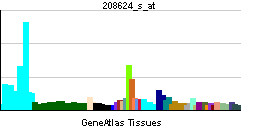Eukaryotic translation initiation factor 4 gamma
Jump to navigation
Jump to search
| Eukaryotic translation initiation factor 4 gamma, 1 | |||||||||||||
|---|---|---|---|---|---|---|---|---|---|---|---|---|---|
 PDB rendering based on 1ug3. | |||||||||||||
| |||||||||||||
| Identifiers | |||||||||||||
| Symbols | EIF4G1 ; EIF4F; DKFZp686A1451; EIF4G; p220 | ||||||||||||
| External IDs | Template:OMIM5 Template:MGI HomoloGene: 28096 | ||||||||||||
| |||||||||||||
| RNA expression pattern | |||||||||||||
 | |||||||||||||
 | |||||||||||||
| More reference expression data | |||||||||||||
| Orthologs | |||||||||||||
| Template:GNF Ortholog box | |||||||||||||
| Species | Human | Mouse | |||||||||||
| Entrez | n/a | n/a | |||||||||||
| Ensembl | n/a | n/a | |||||||||||
| UniProt | n/a | n/a | |||||||||||
| RefSeq (mRNA) | n/a | n/a | |||||||||||
| RefSeq (protein) | n/a | n/a | |||||||||||
| Location (UCSC) | n/a | n/a | |||||||||||
| PubMed search | n/a | n/a | |||||||||||
Eukaryotic translation initiation factor 4 gamma, 1, also known as EIF4G1, is a human gene.
The protein encoded by this gene is a component of the protein complex EIF4F, which is involved in the recognition of the mRNA cap, ATP-dependent unwinding of 5'-terminal secondary structure, and recruitment of mRNA to the ribosome. Alternative splicing results in five transcript variants encoding four distinct isoforms.[1]
References
See Also
Further reading
- Gingras AC, Raught B, Sonenberg N (2000). "eIF4 initiation factors: effectors of mRNA recruitment to ribosomes and regulators of translation". Annu. Rev. Biochem. 68: 913–63. doi:10.1146/annurev.biochem.68.1.913. PMID 10872469.
- Yan R, Rychlik W, Etchison D, Rhoads RE (1992). "Amino acid sequence of the human protein synthesis initiation factor eIF-4 gamma". J. Biol. Chem. 267 (32): 23226–31. PMID 1429670.
- Yan R, Rhoads RE (1995). "Human protein synthesis initiation factor eIF-4 gamma is encoded by a single gene (EIF4G) that maps to chromosome 3q27-qter". Genomics. 26 (2): 394–8. PMID 7601469.
- Mader S, Lee H, Pause A, Sonenberg N (1995). "The translation initiation factor eIF-4E binds to a common motif shared by the translation factor eIF-4 gamma and the translational repressors 4E-binding proteins". Mol. Cell. Biol. 15 (9): 4990–7. PMID 7651417.
- Pause A, Belsham GJ, Gingras AC; et al. (1994). "Insulin-dependent stimulation of protein synthesis by phosphorylation of a regulator of 5'-cap function". Nature. 371 (6500): 762–7. doi:10.1038/371762a0. PMID 7935836.
- Lamphear BJ, Yan R, Yang F; et al. (1993). "Mapping the cleavage site in protein synthesis initiation factor eIF-4 gamma of the 2A proteases from human Coxsackievirus and rhinovirus". J. Biol. Chem. 268 (26): 19200–3. PMID 8396129.
- Haghighat A, Mader S, Pause A, Sonenberg N (1996). "Repression of cap-dependent translation by 4E-binding protein 1: competition with p220 for binding to eukaryotic initiation factor-4E". EMBO J. 14 (22): 5701–9. PMID 8521827.
- Bonaldo MF, Lennon G, Soares MB (1997). "Normalization and subtraction: two approaches to facilitate gene discovery". Genome Res. 6 (9): 791–806. PMID 8889548.
- Lamphear BJ, Rhoads RE (1997). "A single amino acid change in protein synthesis initiation factor 4G renders cap-dependent translation resistant to picornaviral 2A proteases". Biochemistry. 35 (49): 15726–33. doi:10.1021/bi961864t. PMID 8961935.
- Brass N, Heckel D, Sahin U; et al. (1997). "Translation initiation factor eIF-4gamma is encoded by an amplified gene and induces an immune response in squamous cell lung carcinoma". Hum. Mol. Genet. 6 (1): 33–9. PMID 9002667.
- Eberle J, Krasagakis K, Orfanos CE (1997). "Translation initiation factor eIF-4A1 mRNA is consistently overexpressed in human melanoma cells in vitro". Int. J. Cancer. 71 (3): 396–401. PMID 9139875.
- Imataka H, Sonenberg N (1997). "Human eukaryotic translation initiation factor 4G (eIF4G) possesses two separate and independent binding sites for eIF4A". Mol. Cell. Biol. 17 (12): 6940–7. PMID 9372926.
- Gradi A, Imataka H, Svitkin YV; et al. (1998). "A novel functional human eukaryotic translation initiation factor 4G". Mol. Cell. Biol. 18 (1): 334–42. PMID 9418880.
- Piron M, Vende P, Cohen J, Poncet D (1998). "Rotavirus RNA-binding protein NSP3 interacts with eIF4GI and evicts the poly(A) binding protein from eIF4F". EMBO J. 17 (19): 5811–21. doi:10.1093/emboj/17.19.5811. PMID 9755181.
- Imataka H, Gradi A, Sonenberg N (1999). "A newly identified N-terminal amino acid sequence of human eIF4G binds poly(A)-binding protein and functions in poly(A)-dependent translation". EMBO J. 17 (24): 7480–9. doi:10.1093/emboj/17.24.7480. PMID 9857202.
- Pyronnet S, Imataka H, Gingras AC; et al. (1999). "Human eukaryotic translation initiation factor 4G (eIF4G) recruits mnk1 to phosphorylate eIF4E". EMBO J. 18 (1): 270–9. doi:10.1093/emboj/18.1.270. PMID 9878069.
- Laroia G, Cuesta R, Brewer G, Schneider RJ (1999). "Control of mRNA decay by heat shock-ubiquitin-proteasome pathway". Science. 284 (5413): 499–502. PMID 10205060.
- Vary TC, Jefferson LS, Kimball SR (2000). "Amino acid-induced stimulation of translation initiation in rat skeletal muscle". Am. J. Physiol. 277 (6 Pt 1): E1077–86. PMID 10600798.
- Cuesta R, Laroia G, Schneider RJ (2000). "Chaperone hsp27 inhibits translation during heat shock by binding eIF4G and facilitating dissociation of cap-initiation complexes". Genes Dev. 14 (12): 1460–70. PMID 10859165.
| This protein-related article is a stub. You can help Wikipedia by expanding it. |